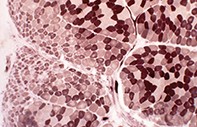Peer Reviewed
Feature Article Neurology
Investigating the patient with muscle weakness
Abstract
An accurate diagnosis is crucial for the management of patients presenting with muscle disorders. There may be important medical consequences for the patients (such as cardiac, respiratory and anaesthetic complications) and genetic implications for both patients and their families.
Key Points
- Patients with muscle disorders may present with various symptoms, including muscle weakness.
- Although muscle weakness often indicates a nerve or muscle condition, it can occur in association with systemic disorders such as endocrine disorders or electrolyte disturbance.
- An accurate diagnosis of muscle disorders is important as there may be genetic, medical and therapeutic implications.
- Important points to consider in the clinical history include the family history and a targeted history for specific symptoms and complications of muscle disorders.
- The creatine kinase (CK) level is a useful marker of muscle disease; however, a normal CK does not always exclude muscle disease.
- Other important tests that may be performed include electromyography and muscle MRI.
- Muscle biopsy is the gold standard investigation for muscle weakness.
Purchase the PDF version of this article
Already a subscriber? Login here.

